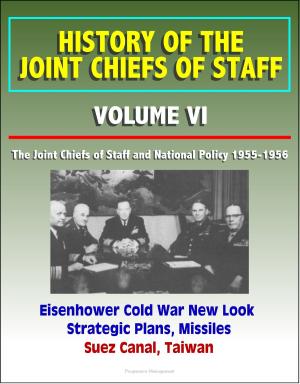George Washington and the Establishment of Civil-Military Operations in Relation to the Declaration of Independence: Military Subordination to the Continental Congress During the Revolutionary War
Nonfiction, Reference & Language, Law, Military, History, Americas, United States, Revolutionary Period (1775-1800)| Author: | Progressive Management | ISBN: | 9780463525708 |
| Publisher: | Progressive Management | Publication: | May 12, 2018 |
| Imprint: | Smashwords Edition | Language: | English |
| Author: | Progressive Management |
| ISBN: | 9780463525708 |
| Publisher: | Progressive Management |
| Publication: | May 12, 2018 |
| Imprint: | Smashwords Edition |
| Language: | English |
This excellent report has been professionally converted for accurate flowing-text e-book format reproduction.
This study examines General George Washington and the establishment of American civil-military relations with respect to the principles of the Declaration of Independence to emphasize Washington's struggle to balance military necessities with the supremacy of law and government by consent. When Washington assumed command of Continental Forces, he faced a unique situation where the army he led curtailed the individual liberties of his soldiers in order to preserve the liberties of the American people. The professional army Washington requested also appears inconsistent with the revolutionary beliefs of colonial Americans who viewed a standing army as a threat to liberty. Despite the appearance of inconsistencies with revolutionary ideals, Washington upheld the principles of the Declaration and maintained military subordination to civil authorities throughout the war. During the first year of the war, Washington established precedents in civil-military relations that maintained military subordination to the Continental Congress and upheld the principles of supremacy of law and government by consent of the people.
CHAPTER 1 - FOUNDATIONS OF THE DECLARATION * CHAPTER 2 - GEORGE WASHINGTON'S EXPERIENCE PRIOR TO THE DECLARATION * CHAPTER 3 - GEORGE WASHINGTON AND CIVIL MILITARY RELATIONS PRIOR TO THE DECLARATION * CHAPTER 4 - CONCLUSION
Although the list of grievances was the focal point of the Declaration, the authors of the Declaration arrive at these principles through the Preamble. Rights originated with the Creator who gave them to individuals. Individuals combined to create governments in order to protect their rights and ensure the happiness of society. A government's only authority is through consent of the people who established the government.81 In colonial history, the people codified this authority in a charter or legal document that defined the powers of the government and became law. This law was supreme and the people were not bound by any act of a government that violated this law. Colonists viewed any attempt by a government to enforce such acts as tyranny.
Americans perceived English history as a struggle to maintain these principles. With the separation from Great Britain, Congress and Washington assumed responsibility to defend these principles and the rights of the people. In command of all Continental Forces for over a year before the Declaration, Washington had the difficult task to defend the principles of the Declaration through military force. To defeat the British Army he needed authority to manage, equip, and command an army, but to uphold the principles of the Declaration he needed to remain subordinate to the elected representatives of the people. Throughout the war, Washington balanced military necessity with the requirement of civilian control. His actions supported the principles of supremacy of law and government by consent.
This excellent report has been professionally converted for accurate flowing-text e-book format reproduction.
This study examines General George Washington and the establishment of American civil-military relations with respect to the principles of the Declaration of Independence to emphasize Washington's struggle to balance military necessities with the supremacy of law and government by consent. When Washington assumed command of Continental Forces, he faced a unique situation where the army he led curtailed the individual liberties of his soldiers in order to preserve the liberties of the American people. The professional army Washington requested also appears inconsistent with the revolutionary beliefs of colonial Americans who viewed a standing army as a threat to liberty. Despite the appearance of inconsistencies with revolutionary ideals, Washington upheld the principles of the Declaration and maintained military subordination to civil authorities throughout the war. During the first year of the war, Washington established precedents in civil-military relations that maintained military subordination to the Continental Congress and upheld the principles of supremacy of law and government by consent of the people.
CHAPTER 1 - FOUNDATIONS OF THE DECLARATION * CHAPTER 2 - GEORGE WASHINGTON'S EXPERIENCE PRIOR TO THE DECLARATION * CHAPTER 3 - GEORGE WASHINGTON AND CIVIL MILITARY RELATIONS PRIOR TO THE DECLARATION * CHAPTER 4 - CONCLUSION
Although the list of grievances was the focal point of the Declaration, the authors of the Declaration arrive at these principles through the Preamble. Rights originated with the Creator who gave them to individuals. Individuals combined to create governments in order to protect their rights and ensure the happiness of society. A government's only authority is through consent of the people who established the government.81 In colonial history, the people codified this authority in a charter or legal document that defined the powers of the government and became law. This law was supreme and the people were not bound by any act of a government that violated this law. Colonists viewed any attempt by a government to enforce such acts as tyranny.
Americans perceived English history as a struggle to maintain these principles. With the separation from Great Britain, Congress and Washington assumed responsibility to defend these principles and the rights of the people. In command of all Continental Forces for over a year before the Declaration, Washington had the difficult task to defend the principles of the Declaration through military force. To defeat the British Army he needed authority to manage, equip, and command an army, but to uphold the principles of the Declaration he needed to remain subordinate to the elected representatives of the people. Throughout the war, Washington balanced military necessity with the requirement of civilian control. His actions supported the principles of supremacy of law and government by consent.















